外研版(2019)选择性必修第二册 Unit2 Improving yourself Using language 公开课课件(共36张PPT)
文档属性
| 名称 | 外研版(2019)选择性必修第二册 Unit2 Improving yourself Using language 公开课课件(共36张PPT) |

|
|
| 格式 | pptx | ||
| 文件大小 | 1.9MB | ||
| 资源类型 | 教案 | ||
| 版本资源 | 外研版(2019) | ||
| 科目 | 英语 | ||
| 更新时间 | 2023-03-03 00:00:00 | ||
图片预览

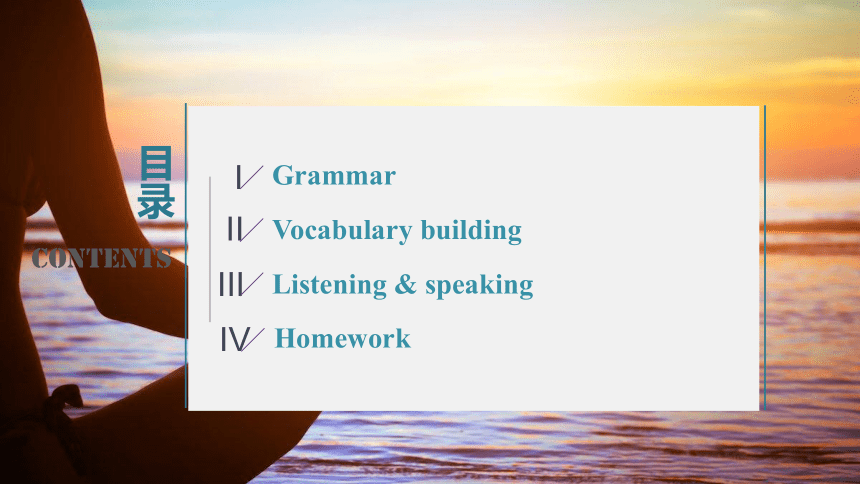



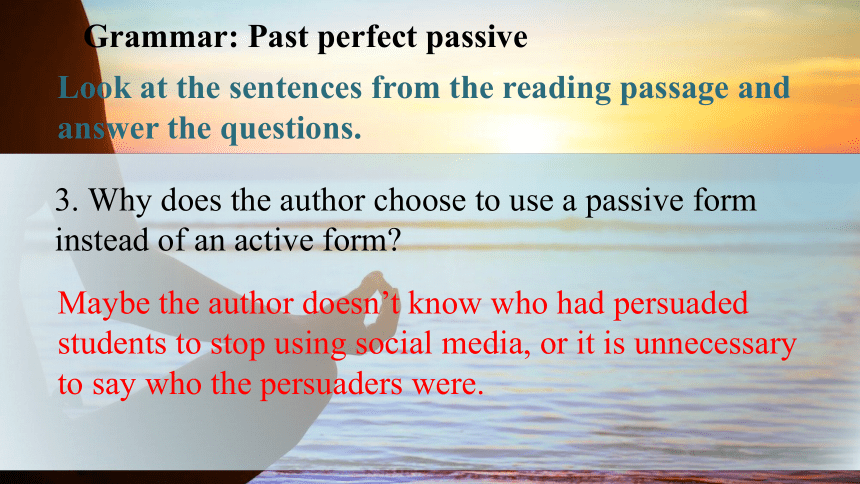

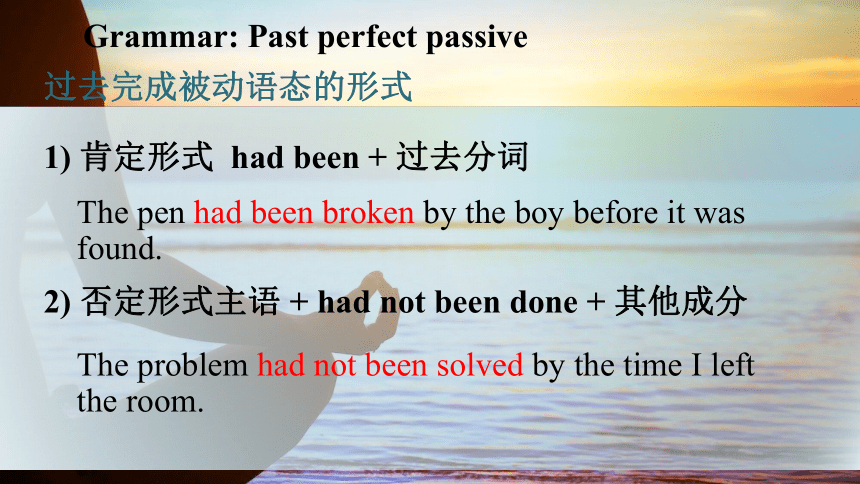
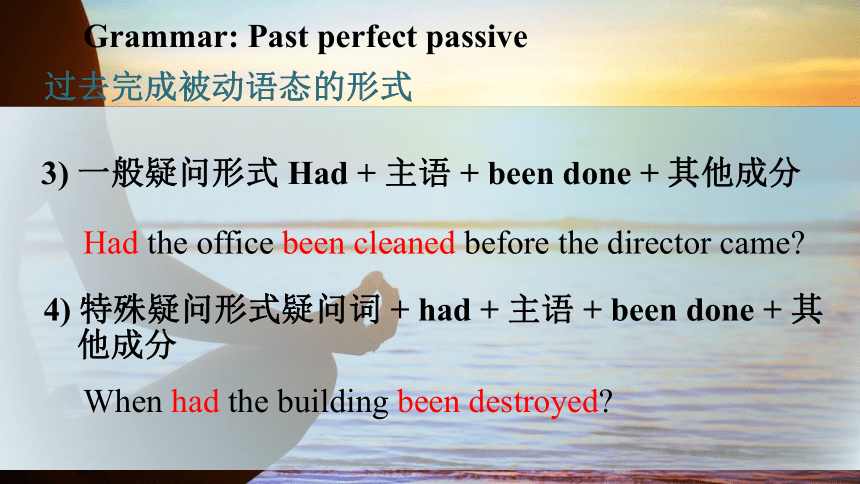

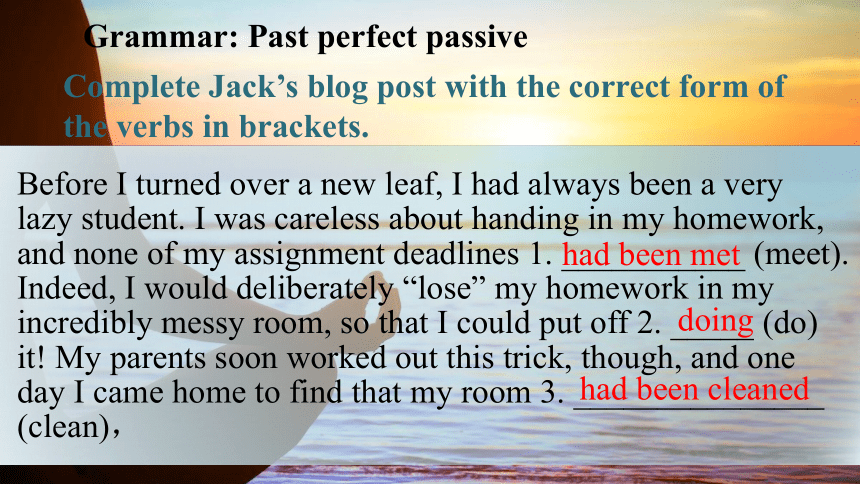

文档简介
(共36张PPT)
Using language
Unit 2 Improving yourself
目录
contents
Grammar
I
IV
Vocabulary building
II
Listening & speaking
III
Homework
I
Grammar
a. At the start of the detox, over 100 students had been persuaded to stop using social media, in ANY form, for seven days.
b. At the start of the detox, people had persuaded over 100 students to stop using social media, in ANY form, for seven days.
Grammar: Past perfect passive
Look at the sentences and answer the questions. Sentence (a) is from the reading passage.
Look at the sentences from the reading passage and answer the questions.
Grammar: Past perfect passive
1. Were the students in sentence (a) persuaded before the detox started, or afterwards
The students were persuaded before the detox started.
2. What is the difference between sentences (a) and (b)
They differ in voice. The passive voice is used in sentence (a), while the active voice is used in sentence (b).
Look at the sentences from the reading passage and answer the questions.
Maybe the author doesn’t know who had persuaded students to stop using social media, or it is unnecessary to say who the persuaders were.
3. Why does the author choose to use a passive form instead of an active form
Grammar: Past perfect passive
过去完成时的被动语态是过去完成时和被动语态的叠合,表示在过去某一时间或某个动作之前已经完成的动作。如下两种情况一般用被动语态:
过去完成被动语态的概念
一是强调动作的承受者,二是不知道谁是动作的执行者,或者没必要指出谁是动作的执行者。例如:
1. The car had been damaged by the flood water.
2. The task had been completed before noon yesterday.
Grammar: Past perfect passive
过去完成被动语态的形式
1) 肯定形式 had been + 过去分词
Grammar: Past perfect passive
2) 否定形式主语 + had not been done + 其他成分
The problem had not been solved by the time I left the room.
The pen had been broken by the boy before it was found.
过去完成被动语态的形式
Grammar: Past perfect passive
3) 一般疑问形式 Had + 主语 + been done + 其他成分
4) 特殊疑问形式疑问词 + had + 主语 + been done + 其
他成分
Had the office been cleaned before the director came
When had the building been destroyed
Grammar: Past perfect passive
过去完成时被动语态和现在完成时被动语态的区别
两者的区别在于某个动作是相对于过去,还是相对于现在来说已被完成。
a. She said her song had been translated into Spanish.
她说她的歌曲已经被翻译成了西班牙语。
b. People’s lives have been changed by online communities
and social networks.
人们的生活已经被线上社群和社交网络改变。
Complete Jack’s blog post with the correct form of
the verbs in brackets.
Before I turned over a new leaf, I had always been a very lazy student. I was careless about handing in my homework, and none of my assignment deadlines 1. ___________ (meet). Indeed, I would deliberately “lose” my homework in my incredibly messy room, so that I could put off 2. _____ (do) it! My parents soon worked out this trick, though, and one day I came home to find that my room 3. _______________ (clean),
Grammar: Past perfect passive
had been met
doing
had been cleaned
and my homework 4. ___________ (put) right in the centre of a spotlessly clean desk! A present 5. ___________ (leave) on the desk, too (I think Mum did that): a book called The Art of Procrastination.
The author, John Perry, said that procrastination was about
6. ________ (avoid) the hardest and most important tasks.
Grammar: Past perfect passive
had been put
avoiding
had been left
Complete Jack’s blog post with the correct form of
the verbs in brackets.
So, 7. _______ (make) sure you do your homework, put it second or third on your to-do list, not at the top. Then put one or two really hard things you don’t want to do at the top of the list. You will procrastinate to avoid the hard stuff — by doing your homework!
Grammar: Past perfect passive
to make
Complete Jack’s blog post with the correct form of
the verbs in brackets.
Work in pairs. Describe the pictures using the past perfect passive.
Jack started the habit of cleaning his room last week. This is what his room looked like yesterday morning.
Grammar: Past perfect passive
The floor was clean.
The sheet was laid flat on the bed.
All the books and clothes were placed neatly and tidily.
The pictures on the wall were straight.
But two weeks ago, Jack’s room was like this: ...
Grammar: Past perfect passive
His clothes had been thrown everywhere.
The pictures had not been hung straight.
All the drawers had been opened.
It had been a very disorderly sort of room, with books and papers lying around everywhere.
Work in pairs. Describe the pictures using the past perfect passive.
Jack started the habit of cleaning his room last week. This is what his room looked like yesterday morning. (The floor was clean. The sheet was laid flat on the bed. All the books and clothes were placed neatly and tidily. The pictures on the wall were straight.) But two weeks ago, Jack’s room had been an awful mess. His clothes had been thrown everywhere; the pictures had not been hung straight; and all the drawers had been opened. It had been a very disorderly sort of room, with books and papers lying around everywhere.
Grammar: Past perfect passive
Work in pairs. Describe the pictures using the past perfect passive.
Work in pairs. Talk about what had happened before you started a new habit of your own. Use the past perfect passive where appropriate.
Grammar: Past perfect passive
II
Vocabulary building
a
Match the sentences to the signs. Pay attention to the
words and expressions in bold.
a
b
c
d
e
f
( ) 1. Do not litter.
( ) 2. Do not talk loudly in
public.
( ) 3. Do not spit in public.
( ) 4. Do not walk on the
grass.
( ) 5. Do not smoke.
( ) 6. Do not take photos.
a
b
e
f
c
d
Vocabulary building
Complete the conversations with the correct form of the words and expressions in Activity 5.
1. A: What do you do when people _________________
B: I put my headphones on. I don’t want to hear other
people’s conversations.
2. A: How can we stop people _____________________
B: We should tell them it’s dirty and it can spread diseases.
talk loudly in public
(from) spitting in public
Vocabulary building
Complete the conversations with the correct form of the words and expressions in Activity 5.
3. A: What would you do if you saw people ________
B: I would go up to them and ask them to put the litter
into a rubbish bin.
4. A: How can we prevent people from _________________
B: If we keep the grass looking really neat, maybe
people will realise they shouldn’t walk on it.
littering
walking on the grass
Vocabulary building
Complete the conversations with the correct form of the words and expressions in Activity 5.
5. A: What would you do if you saw someone ________
where it’s not allowed
B: I’d politely remind them it’s not permitted, and that
they should be considerate of others.
6. A: What would you do if you saw someone ___________
in a museum
B: I’d ask them to stop, because it can damage the exhibits.
smoking
taking photos
Vocabulary building
Now work in pairs. Think of more types of inappropriate behaviour and talk about what you think is the right thing to do when faced with them.
Vocabulary building
III
Listening & speaking
Listening & speaking: While-listening
Listen to the interview and choose a topic for it.
1. How to promote values education.
2. How to inspire students to work hard.
3. How to introduce school programmes.
4. How to fairly distribute books and umbrellas.
A school in our city came up with an innovative programme to promote the traditional value of 1. ______. School principal Ms Wu gave several examples of how the programme works.
To begin with, the school introduced an activity called the “unsupervised examination” for some of the classes. That means during this examination, there is no
Listening & speaking: While-listening
Listen again and complete the newspaper report.
honesty
Listening & speaking: While-listening
teacher 2. _________________________. Before taking this examination, students first need to 3. ____________ ___________. Students generally expressed that it’s good to feel 4. ______ and they quite enjoyed 5. ____________________ in the examination. In turn, they developed 6. ____________________.
present to oversee the students
sign a letter of
commitment
trusted
the relaxed atmosphere
greater self-control
Listen again and complete the newspaper report.
Listening & speaking: While-listening
The school also introduced what is called the 7. “ _______ __________.” Printed on each umbrella was a short statement about 8. ________________________. At the end of the term, all the umbrellas were returned 9. ___________. None of them had been lost or damaged.
honesty
umbrella
honesty and other values
in one piece
Listen again and complete the newspaper report.
Listening & speaking: While-listening
Now Ms Wu and her colleagues plan to introduce the programme to 10. _________________________. Everyone needs to work together to build a culture of honesty. They hope more teachers and students will get involved.
another branch of the school
Listen again and complete the newspaper report.
Listening & speaking: Pair work
Now work in pairs. Talk about the significance of promoting values education in schools.
Listening & speaking: Summary
Complete the boxes with the expressions from the
interview.
I can give a couple of examples.
That is …
Let me clarify …
For instance, …
I mean …
Take … as an illustration.
To put it another way, …
Clarifying what you mean Giving examples
Listening & speaking: Summary
Clarifying what you mean Giving examples
That is …
Let me clarify …
I mean …
To put it another way, …
For instance …
Take … as an illustration.
I can give a couple of
examples.
Complete the boxes with the expressions from the
interview.
Listening & speaking: Pair work
Work in groups. Discuss how to promote values education at your school using the words and expressions in this section.
Listening & speaking: Pair work
Now talk about how well you did in offering effective advice or ideas and developing effective solutions in the group discussion.
IV
Homework
Homework
1. Summarize the usage of Past perfect
passive and do the relevant exercises.
2. Write an article to your school
newspaper about your views in
promoting values education.
Using language
Unit 2 Improving yourself
目录
contents
Grammar
I
IV
Vocabulary building
II
Listening & speaking
III
Homework
I
Grammar
a. At the start of the detox, over 100 students had been persuaded to stop using social media, in ANY form, for seven days.
b. At the start of the detox, people had persuaded over 100 students to stop using social media, in ANY form, for seven days.
Grammar: Past perfect passive
Look at the sentences and answer the questions. Sentence (a) is from the reading passage.
Look at the sentences from the reading passage and answer the questions.
Grammar: Past perfect passive
1. Were the students in sentence (a) persuaded before the detox started, or afterwards
The students were persuaded before the detox started.
2. What is the difference between sentences (a) and (b)
They differ in voice. The passive voice is used in sentence (a), while the active voice is used in sentence (b).
Look at the sentences from the reading passage and answer the questions.
Maybe the author doesn’t know who had persuaded students to stop using social media, or it is unnecessary to say who the persuaders were.
3. Why does the author choose to use a passive form instead of an active form
Grammar: Past perfect passive
过去完成时的被动语态是过去完成时和被动语态的叠合,表示在过去某一时间或某个动作之前已经完成的动作。如下两种情况一般用被动语态:
过去完成被动语态的概念
一是强调动作的承受者,二是不知道谁是动作的执行者,或者没必要指出谁是动作的执行者。例如:
1. The car had been damaged by the flood water.
2. The task had been completed before noon yesterday.
Grammar: Past perfect passive
过去完成被动语态的形式
1) 肯定形式 had been + 过去分词
Grammar: Past perfect passive
2) 否定形式主语 + had not been done + 其他成分
The problem had not been solved by the time I left the room.
The pen had been broken by the boy before it was found.
过去完成被动语态的形式
Grammar: Past perfect passive
3) 一般疑问形式 Had + 主语 + been done + 其他成分
4) 特殊疑问形式疑问词 + had + 主语 + been done + 其
他成分
Had the office been cleaned before the director came
When had the building been destroyed
Grammar: Past perfect passive
过去完成时被动语态和现在完成时被动语态的区别
两者的区别在于某个动作是相对于过去,还是相对于现在来说已被完成。
a. She said her song had been translated into Spanish.
她说她的歌曲已经被翻译成了西班牙语。
b. People’s lives have been changed by online communities
and social networks.
人们的生活已经被线上社群和社交网络改变。
Complete Jack’s blog post with the correct form of
the verbs in brackets.
Before I turned over a new leaf, I had always been a very lazy student. I was careless about handing in my homework, and none of my assignment deadlines 1. ___________ (meet). Indeed, I would deliberately “lose” my homework in my incredibly messy room, so that I could put off 2. _____ (do) it! My parents soon worked out this trick, though, and one day I came home to find that my room 3. _______________ (clean),
Grammar: Past perfect passive
had been met
doing
had been cleaned
and my homework 4. ___________ (put) right in the centre of a spotlessly clean desk! A present 5. ___________ (leave) on the desk, too (I think Mum did that): a book called The Art of Procrastination.
The author, John Perry, said that procrastination was about
6. ________ (avoid) the hardest and most important tasks.
Grammar: Past perfect passive
had been put
avoiding
had been left
Complete Jack’s blog post with the correct form of
the verbs in brackets.
So, 7. _______ (make) sure you do your homework, put it second or third on your to-do list, not at the top. Then put one or two really hard things you don’t want to do at the top of the list. You will procrastinate to avoid the hard stuff — by doing your homework!
Grammar: Past perfect passive
to make
Complete Jack’s blog post with the correct form of
the verbs in brackets.
Work in pairs. Describe the pictures using the past perfect passive.
Jack started the habit of cleaning his room last week. This is what his room looked like yesterday morning.
Grammar: Past perfect passive
The floor was clean.
The sheet was laid flat on the bed.
All the books and clothes were placed neatly and tidily.
The pictures on the wall were straight.
But two weeks ago, Jack’s room was like this: ...
Grammar: Past perfect passive
His clothes had been thrown everywhere.
The pictures had not been hung straight.
All the drawers had been opened.
It had been a very disorderly sort of room, with books and papers lying around everywhere.
Work in pairs. Describe the pictures using the past perfect passive.
Jack started the habit of cleaning his room last week. This is what his room looked like yesterday morning. (The floor was clean. The sheet was laid flat on the bed. All the books and clothes were placed neatly and tidily. The pictures on the wall were straight.) But two weeks ago, Jack’s room had been an awful mess. His clothes had been thrown everywhere; the pictures had not been hung straight; and all the drawers had been opened. It had been a very disorderly sort of room, with books and papers lying around everywhere.
Grammar: Past perfect passive
Work in pairs. Describe the pictures using the past perfect passive.
Work in pairs. Talk about what had happened before you started a new habit of your own. Use the past perfect passive where appropriate.
Grammar: Past perfect passive
II
Vocabulary building
a
Match the sentences to the signs. Pay attention to the
words and expressions in bold.
a
b
c
d
e
f
( ) 1. Do not litter.
( ) 2. Do not talk loudly in
public.
( ) 3. Do not spit in public.
( ) 4. Do not walk on the
grass.
( ) 5. Do not smoke.
( ) 6. Do not take photos.
a
b
e
f
c
d
Vocabulary building
Complete the conversations with the correct form of the words and expressions in Activity 5.
1. A: What do you do when people _________________
B: I put my headphones on. I don’t want to hear other
people’s conversations.
2. A: How can we stop people _____________________
B: We should tell them it’s dirty and it can spread diseases.
talk loudly in public
(from) spitting in public
Vocabulary building
Complete the conversations with the correct form of the words and expressions in Activity 5.
3. A: What would you do if you saw people ________
B: I would go up to them and ask them to put the litter
into a rubbish bin.
4. A: How can we prevent people from _________________
B: If we keep the grass looking really neat, maybe
people will realise they shouldn’t walk on it.
littering
walking on the grass
Vocabulary building
Complete the conversations with the correct form of the words and expressions in Activity 5.
5. A: What would you do if you saw someone ________
where it’s not allowed
B: I’d politely remind them it’s not permitted, and that
they should be considerate of others.
6. A: What would you do if you saw someone ___________
in a museum
B: I’d ask them to stop, because it can damage the exhibits.
smoking
taking photos
Vocabulary building
Now work in pairs. Think of more types of inappropriate behaviour and talk about what you think is the right thing to do when faced with them.
Vocabulary building
III
Listening & speaking
Listening & speaking: While-listening
Listen to the interview and choose a topic for it.
1. How to promote values education.
2. How to inspire students to work hard.
3. How to introduce school programmes.
4. How to fairly distribute books and umbrellas.
A school in our city came up with an innovative programme to promote the traditional value of 1. ______. School principal Ms Wu gave several examples of how the programme works.
To begin with, the school introduced an activity called the “unsupervised examination” for some of the classes. That means during this examination, there is no
Listening & speaking: While-listening
Listen again and complete the newspaper report.
honesty
Listening & speaking: While-listening
teacher 2. _________________________. Before taking this examination, students first need to 3. ____________ ___________. Students generally expressed that it’s good to feel 4. ______ and they quite enjoyed 5. ____________________ in the examination. In turn, they developed 6. ____________________.
present to oversee the students
sign a letter of
commitment
trusted
the relaxed atmosphere
greater self-control
Listen again and complete the newspaper report.
Listening & speaking: While-listening
The school also introduced what is called the 7. “ _______ __________.” Printed on each umbrella was a short statement about 8. ________________________. At the end of the term, all the umbrellas were returned 9. ___________. None of them had been lost or damaged.
honesty
umbrella
honesty and other values
in one piece
Listen again and complete the newspaper report.
Listening & speaking: While-listening
Now Ms Wu and her colleagues plan to introduce the programme to 10. _________________________. Everyone needs to work together to build a culture of honesty. They hope more teachers and students will get involved.
another branch of the school
Listen again and complete the newspaper report.
Listening & speaking: Pair work
Now work in pairs. Talk about the significance of promoting values education in schools.
Listening & speaking: Summary
Complete the boxes with the expressions from the
interview.
I can give a couple of examples.
That is …
Let me clarify …
For instance, …
I mean …
Take … as an illustration.
To put it another way, …
Clarifying what you mean Giving examples
Listening & speaking: Summary
Clarifying what you mean Giving examples
That is …
Let me clarify …
I mean …
To put it another way, …
For instance …
Take … as an illustration.
I can give a couple of
examples.
Complete the boxes with the expressions from the
interview.
Listening & speaking: Pair work
Work in groups. Discuss how to promote values education at your school using the words and expressions in this section.
Listening & speaking: Pair work
Now talk about how well you did in offering effective advice or ideas and developing effective solutions in the group discussion.
IV
Homework
Homework
1. Summarize the usage of Past perfect
passive and do the relevant exercises.
2. Write an article to your school
newspaper about your views in
promoting values education.
